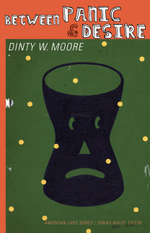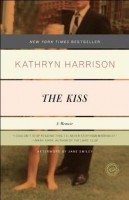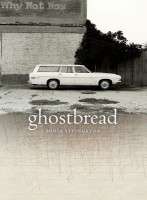Author Spotlight
6 Books: Dinty W. Moore on Memoir
 This is the first installment in a new feature where I ask a writer to recommend 6 books, old or new, sometimes according to some roomy guideline. In this case, I asked Dinty W. Moore, editor of Brevity and author of the memoir-in-essays, Between Panic and Desire, to recommend 6 memoirs. Here’s what he had to offer.
This is the first installment in a new feature where I ask a writer to recommend 6 books, old or new, sometimes according to some roomy guideline. In this case, I asked Dinty W. Moore, editor of Brevity and author of the memoir-in-essays, Between Panic and Desire, to recommend 6 memoirs. Here’s what he had to offer.
Narrowing my list of representative memoirs down to six was an agonizing task, because there are so many solid examples. To keep the undertaking manageable (barely), I’ve limited myself to the last twenty years or so, and instead of a ‘favorites’ list, I’ve chosen six examples that I think show the range of what memoir can do.
My concise description of memoir is “the truth, artfully arranged.” Now we can argue about the meaning of the word truth for weeks, but I’d rather not. I think – despite all of the weakness of memory (and for that matter, observation) – that sophisticated readers understand that the truth they are given in memoir is the author’s subjective truth. There is no hope of objective accuracy, nor would that be as interesting to read. But you go after your truth, with honest intent. That means that an author who is willingly, consciously subverting what he remembers is not writing memoir, by my definition. Cross that line, and you are writing fiction. Which is fine, but it is another project entirely.
So I’ve pulled these six memoirs down from my shelves to illustrate how a life can be presented artfully. Starting with:
This Boy’s Life, Tobias Wolff (1989): Wolff’s memoir is the first that I remember reading. I had read autobiography, of course, and long-form journalism, but Wolff’s brutally-honest, cinematic childhood memoir was the first to give me what previously I had only found in novels: the ability to escape into someone else’s life and another world, another time. Wolff wasn’t the first to write memoir in this way, but This Boy’s Life remains a touchstone to me and many other writers. I love the opening note to the reader: “I have been corrected on some points, mostly of chronology. Also my mother thinks that a dog I describe as ugly was actually quite handsome. I’ve allowed some of these points to stand, because this is a book of memory, and memory has its own story to tell.”
 The Kiss, Kathryn Harrison (1997): Like many people, my first introduction to this book was the wave of denunciation that followed its release: denunciation of the author’s life (she engaged as a young woman in an incestuous relationship with her estranged father), and denunciation of the author’s decision to speak of it in this book. Thank goodness I eventually read The Kiss. Harrison’s restraint, her precision, her shocking honesty, and the chilling detail combine to create an unforgettable psychological portrait. Should victims remain silent? Hell no. (Random House is reissuing The Kiss next month.)
The Kiss, Kathryn Harrison (1997): Like many people, my first introduction to this book was the wave of denunciation that followed its release: denunciation of the author’s life (she engaged as a young woman in an incestuous relationship with her estranged father), and denunciation of the author’s decision to speak of it in this book. Thank goodness I eventually read The Kiss. Harrison’s restraint, her precision, her shocking honesty, and the chilling detail combine to create an unforgettable psychological portrait. Should victims remain silent? Hell no. (Random House is reissuing The Kiss next month.)
A Heartbreaking Work of Staggering Genius Dave Eggers (2000): Not my favorite book to read, frankly – it goes on too long in places, seems too clever by half in others – but Eggers shook up the form, opened possibilities, brought younger readers into the genre, and I tip my hat to him for the chances he took.
The Blessing, Gregory Orr (2002): At age twelve, the author shot and killed his younger brother Peter in a hunting accident. His intimate description of the event is clear, unadorned and powerful. Best known as a poet, Orr brings a meticulous eye to his memoir and a mastery of image, description, and language.
 The Horizontal World: Growing Up Wild In the Middle of Nowhere Debra Marquart (2006): Marquart’s memoir captures not only a life but a place: rural, western North Dakota. This book is poignant, funny at times, free-wheeling, and entirely engaging.
The Horizontal World: Growing Up Wild In the Middle of Nowhere Debra Marquart (2006): Marquart’s memoir captures not only a life but a place: rural, western North Dakota. This book is poignant, funny at times, free-wheeling, and entirely engaging.
Ghostbread Sonja Livingston (2009): This recent memoir, an exquisite, close-in look at childhood poverty, is full of tender humor, and shows us the perilous ease of slipping into failure and the love that can flow from even a highly troubled parent. Plus, Livingston is a helluva of a writer, an exquisite storyteller.
Tags: 6 books, Dave Eggers, debra marquart, Dinty W. Moore, gregory orr, kathryn harrison, sonja livingston, tobias wolff

Great feature. I loved these selections, and I love the idea. Hope you keep this running.
Loved Debra Marquart’s book, as well as Wolff’s.
[…] DINTY W. MOORE’S MEMOIR RECOMMENDATIONS […]
tinyurl.com/297sxrk
[…] of Brevity, and faculty member at Ohio University, found it hard to pick the top six memoirs for Amy McDaniel’s post on the Author’s Spotlight blog until he decided to pick his favorites as a way to emphasize […]
tinyurl.com/297sxrk
tinyurl.com/297sxrk
[…] a series where I ask writers I like for 6 book recommendations according to some loose guideline. Part I is here. This week, Kevin Sampsell, editor of Future Tense Books out of Portland, Oregon, doyen of […]
Good selection. 3 I’ve read to validate my good taste; and 2 exciting new ones that I’ll hurry out and look for today. The last three. Much appreciated!
In your review of the six memoirs the words honest and memory appear to contradict one another, in others words an oxymoron. However, as you point out, memoirs are the author’s subjective truth. Having published a memoir of growing up under apartheid in South Africa, I was gratified by one reviewer who wrote of my memoir, “it’s a heck of a story honestly told.” As for your top six picks, for me as a reader they tend to lean to heartbreak and abuse. I recently read Hands of my Father, by Myron Uhlberg, a boy brought up by deaf parents, which I highly recommend.
[…] where I ask writers I like for 6 book recommendations according to some loose guideline. Part I is here; Part II is here. This week is another installment on nonfiction, this time brought to us by Maggie […]
[…] that line, and you are writing fiction. Which is fine, but it is another project entirely. (Dinty W. Moore, who is our teacher […]